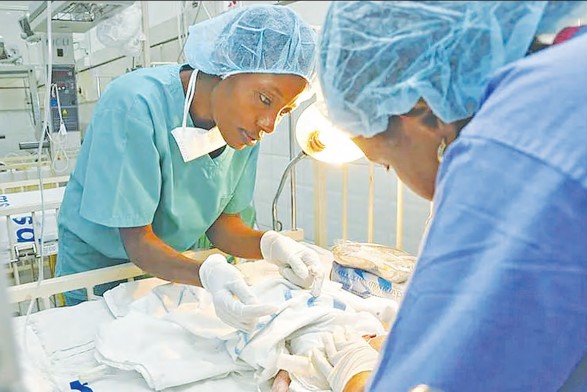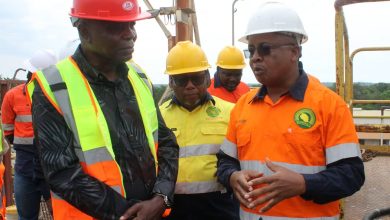Health Basket Fund: Transforming healthcare in Morogoro

MOROGORO: IN recent years, Tanzania has witnessed a significant transformation in its healthcare delivery system, with the Health Basket Fund (HBF) emerging as a pivotal driver of change, especially in the Morogoro Region.
Launched to improve access to quality healthcare services through collaborative efforts between the government and development partners, the fund has made substantial contributions from 2021/2022 to the 2024/2025 financial year In Morogoro Region alone, the initiative has ushered in a new era of infrastructure upgrades, improved medical supplies, and enhanced staff capabilities across the region’s nine councils.
Between 2021 and 2025, Morogoro Region received a total of 21.59bn/- from the HBF.
Out of this amount, 20.91bn/- was allocated directly to local government authorities to implement key health interventions.
The funds were strategically allocated across various priority areas: 18bn/- supported primary healthcare service delivery, over 2.8bn/- was allocated for supervision and monitoring and nearly 674m/- was earmarked for regional-level oversight of health services.
These investments, aligned with national health objectives, have helped bridge the gap between policy and practice—bringing life-saving services closer to communities.
Speaking on behalf of the Morogoro Regional Medical Officer (RMO) Mr Best Magoma, Regional Health Secretary Ms Verediana Kajala said HBF has become a lifeline for improved health services in the region since the fund was established in 1999.
“We highly depend on the basket fund to run our core activities of providing health services to the people…it is unfortunate to note that the government is doing a lot to improve health services but, in most cases, such efforts go unnoticed or unappreciated,” she said, adding that the funds also help a great deal in countering pandemics and epidemics.
“We are glad that the funding we receive from this programme, is channelled towards nutrition care and social services as well as vaccination programmes,” she said.
She said the region spends 35 per cent of HBF towards purchase of medicine and medical equipment as well as infrastructure overhaul.
“One of the most visible impacts of the fund has been the upgrading of health infrastructure. Health centres and dispensaries across the region have benefitted from renovations and construction of essential facilities such as inpatient wards, outpatient buildings, waste incinerators, surgical theatres, storage facilities for medical supplies and residential housing for health workers,” she said.
These improvements have significantly enhanced service delivery and working conditions for medical personnel, ensuring that even remote communities have access to better-equipped and safer healthcare environments.
She said the flow of HBF has also significantly helped the region to address the shortage of staff challenge.
ALSO READ: How life-saving EECC implementation can transform Tanzania’s Healthcare
“We normally conduct annual staff needs and submit our requirements to the central government… we are glad that such submission are always swiftly responded to by the government. It is through this programme that the government always wants us to engage volunteers in the health sector as well as to recruit staff on contract basis,” she said.
Indeed, the implication of the HBF has enabled access to medicines and medical supplies in Morogoro Region to reach 98 per cent.
A key challenge in public healthcare has long been the availability of medicines and equipment.
The HBF addressed this head-on by allocating 35 per cent of the total funds toward the purchase and maintenance of medical supplies, with procurement carried out via the Medical Stores Department (MSD) and certified private suppliers.
As a result, the average availability of essential drugs and equipment in the region soared to 98 per cent, a milestone that has directly impacted patient care and satisfaction.
At Mvomero District Hospital, one will wonder the existence of one of the exquisite facilities, placed at the scenery that will certainly pleasure a patient.
It is a quiet location, well designed, fully equipped and specious rooms to accommodate patients.
Council’s Chief Medical Officer (CMO) Dr Phillipina Philipo clearly draws the line of challenges that existed before the HBF was introduced some two decades ago, saying complaints from citizens have significantly been subdued because services have improved.
“In the current financial year, we have been allocated with 898m/- up from 700m/- we received in the 2023/24 and 600m/- that was allocated in 2022/23.
“This programme has helped to check complaints from citizens because they now get reliable services. For instance, previously our dispensaries lacked medical services but now things have changed significantly, surgeon cetres for pregnant women, who had to walk long distance in search for services have increased from five to eight. The number of pregnant women who have access to medical services has now reached 80 per cent,” she said.
The CMO said improved service delivery in Mvomero District Council has reduced child mortality from 80 per cent two years ago to 60 per cent last year. Pregnant mortality in 2020 stood at 15 but tat figure has been reduced to five last year.
“This year, we have registered only two deaths, thanks to massive investment made by the government through the Health Basket Fund. We have procured server machines like delivery kits; anaesthesia machine and cesarean section sets.
“We have also been able to procure medicine and medical supplies and equipment as well as working tools such as computers and furniture which has eased service provision,” she said.
The availability of improved medical equipment is pleasing the staff at the Mvomero District Hospital.
Graciana Ulomi, who is a nurse in charge of neonatal infectious and non-infectious rooms said the availability of neonatal infectious and noninfectious rooms in a district hospital has significantly improved service provision in several ways especially in terms of patient outcomes, infection control and overall quality of neonatal care.
ALSO READ: Tanzania’s free healthcare services to pregnant women hit 65pc target
She said providing separate neonatal infectious and non-infectious rooms at the district hospital level is a low-cost, high-impact intervention. It enhances neonatal outcomes, protects vulnerable infants and raises the overall standard of care, especially in resource-limited environments.
“Isolation of infectious neonates prevents the spread of disease to non-infected or immunocompromised neonates. It also helps to reduce hospital-acquired infections (HAIs)—a major cause of neonatal morbidity and mortality in low-resource settings as well as enables better implementation of infection control protocols,” she said.
Mvomero District Commissioner (DC) Ms Judith Nguli expressed gratitude to the government for introducing HBF, much as there are still minor challenges here and there, especially in areas where dispensaries are far much to reach.
In such areas, she said, HBF delivers through outreach and mobile clinics. She said HBF supports service provision through outreach mobile clinics, especially as part of efforts to improve access to healthcare in hard-to-reach and underserved areas.
“HBF enables outreach mobile clinic services as part of its mission to decentralise healthcare delivery and ensure equitable access to quality services, especially for vulnerable and remote populations. These services are often embedded in district health plans and tailored to local needs,” she said.
She added that HBF is really performing well. “Complaints on lack of medicines and medical supplies are now things of the past. We have seen impressive increase in number of dispensaries MMama programme.
In Mvomero District, the M-Mama programme has been active since 2020 targeting to improve maternal and child health.
The M-Mama service in Mvomero connects women in remote areas with emergency healthcare services, facilitating timely access to medical care.
The programme’s success is attributed to its communitybased approach, which includes engaging local leaders, training community health workers and establishing a dispatch system that coordinates transportation through a mobile app.
This model has been effective in reducing delays in seeking and receiving medical care, which are critical factors in preventing maternal and neonatal deaths.
For residents of Mvomero and surrounding areas, the M-Mama service offers a vital lifeline, ensuring that women and newborns can access emergency medical care promptly, regardless of their location.
Another area of focus has been nutrition services, particularly for children under five.
The Mvomero District Council is setting aside HBF resources to train community health workers, supply growth monitoring tools, and conduct public education on nutrition.
Campaigns to administer Vitamin A supplements have reached thousands of children and mothers are now better informed on the importance of balanced diets and nutritional health, thanks to community outreach initiatives.
The Covid-19 pandemic underscored the importance of health systems that are resilient and responsive.
HBF funding has strengthened Morogoro’s capacity to detect, monitor, and respond to disease outbreaks, including measles and other epidemics. From 2021 to 2023, the region conducted intensive surveillance of measles cases and launched swift immunisation drives.
READ MORE: Janabi role will advance TZ’s healthcare agendas, analysts say
HBF also supported lab technician training, and Direct Health Facility Financing (DHFF) enabled health centres to access funds directly for outbreak response.
In Mvomero District, community-led sanitation campaigns (CLTS) were launched to boost hygiene and disease prevention, a move that has had long-term benefits in controlling preventable diseases.
The success of the HBF in Morogoro Region highlights the transformative potential of coordinated investments in health.
By aligning development partner support with national priorities, and empowering local authorities through direct financing, Tanzania is building a more resilient and inclusive healthcare system.
As the country continues to pursue universal health coverage and improved wellbeing for all, Morogoro stands as a testament to what can be achieved when public funds are directed where they matter most—closer to the people.





